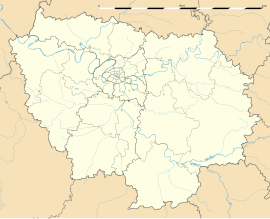Nemours
Nemours | |
|---|---|
 Castle of Nemours | |
| Coordinates: 48°16′03″N 2°41′49″E / 48.2674°N 2.697°E | |
| Country | France |
| Region | Île-de-France |
| Department | Seine-et-Marne |
| Arrondissement | Fontainebleau |
| Canton | Nemours |
| Government | |
| • Mayor (2020–2026) | Valérie Lacroute[1] (LR) |
| Area 1 | 10.83 km2 (4.18 sq mi) |
| Population (2021)[2] | 13,189 |
| • Density | 1,200/km2 (3,200/sq mi) |
| Time zone | UTC+01:00 (CET) |
| • Summer (DST) | UTC+02:00 (CEST) |
| INSEE/Postal code | 77333 /77140 |
| Elevation | 57–133 m (187–436 ft) (avg. 62 m or 203 ft) |
| 1 French Land Register data, which excludes lakes, ponds, glaciers > 1 km2 (0.386 sq mi or 247 acres) and river estuaries. | |
Nemours (French: [nəmuʁ] ) is a commune in the Seine-et-Marne department in the Île-de-France region in north-central France.
Geography
Nemours is located on the Loing and its canal, c. 42 km (26 mi) south of Melun, on the Moret–Lyon railway. Nemours – Saint-Pierre station has rail connections to Montargis, Melun, Nevers and Paris.
History
Nemours is supposed to derive its name from the woods (nemora) in the midst of which it formerly stood, and discoveries of Gallo-Roman remains indicate its early origin. It was captured by the English in 1420, but derives its historical importance rather from the lordship (afterwards duchy) of Nemours,[3] and the fief lords the Duke of Nemours to which it gave its name. In 1585 a treaty revoking previous concessions to the Protestants was concluded at Nemours between Catherine de' Medici and the Guises.
Demographics
Inhabitants are called Nemouriens.
Graphs are unavailable due to technical issues. There is more info on Phabricator and on MediaWiki.org. |
| Year | Pop. | ±% p.a. |
|---|---|---|
| 1968 | 8,131 | — |
| 1975 | 11,223 | +4.71% |
| 1982 | 11,665 | +0.55% |
| 1990 | 12,072 | +0.43% |
| 1999 | 12,898 | +0.74% |
| 2007 | 12,813 | −0.08% |
| 2012 | 12,770 | −0.07% |
| 2017 | 13,081 | +0.48% |
| Source: INSEE[4] | ||
Sights
The church, which dates mainly from the sixteenth century, has a handsome wooden spire. The feudal castle, erected around 1120 was turned into a museum in the 20th century. It has a central keep with four rounded towers.
A statue of the mathematician Bézout (d. 1783), a native of the town, was erected in 1885.
In the vicinity is a group of fine sandstone rocks, and sand is extensively quarried.
The city also hosts the Musée de Préhistoire d'Île-de-France, museum dedicated to prehistory in Île-de-France region.
Close to the city, at Saint-Pierre-lès-Nemours, is located the forest Massif forestier des Rochers-Gréau.
Hospital
Nemours has a campus of the Centre hospitalier Sud Seine et Marne.
Notable people
Nemours was the birthplace of:
- Pierre Berthier (1782-1861), geologist and mining engineer
- Étienne Bézout (1730–1783), mathematician
- Geoffrey Kondogbia (born 1993), professional footballer
- Justin-Chrysostome Sanson (1833–1910), sculptor
- Philippe Petit (1949-), highwire artist
Twin towns – sister cities
 Mühltal, Germany
Mühltal, Germany Wilmington, United States
Wilmington, United States

See also
References
- This article incorporates text from a publication now in the public domain: Chisholm, Hugh, ed. (1911). "Nemours". Encyclopædia Britannica. Vol. 19 (11th ed.). Cambridge University Press. p. 371.
- ^ "Répertoire national des élus: les maires" (in French). data.gouv.fr, Plateforme ouverte des données publiques françaises. 6 June 2023.
- ^ "Populations légales 2021" (in French). The National Institute of Statistics and Economic Studies. 28 December 2023.
- ^ Le duché de Nemours, Géographie historique de la France, Histoire de l'Europe. France 2008|http://www.cosmovisions.com/histNemours.htm
- ^ Population en historique depuis 1968, INSEE
- ^ "Jumelage & échanges internationaux" (in French). Nemours. Retrieved 2022-04-05.
External links
- Official site (in French)
- Nemours tourism office website
- 1999 Land Use, from IAURIF (Institute for Urban Planning and Development of the Paris-Île-de-France région) (in English)
- Base Mérimée: Search for heritage in the commune, Ministère français de la Culture. (in French)




